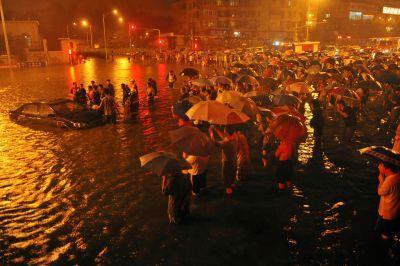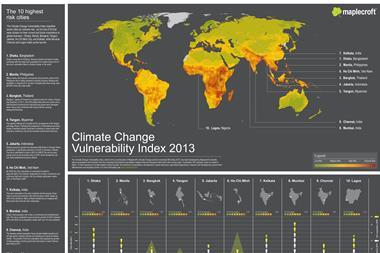UK Government report calls on risk reduction to protect lives and livelihoods from heightened risk of natural catastrophes

People in the world’s poorest countries will become increasingly at risk from natural disasters over the next 30 years, according to a new report by the UK Government.
Led by the UK’s chief scientific adviser, Sir John Beddington, the report titled Reducing the Risks of Future Disasters: Priorities for Decision Makers said that there will be an increased risk to people across the globe from natural disasters such as tsunamis, earthquakes and epidemics.
However, it makes clear that this increase can be offset by proactive mitigation, and provides recommendations for disaster risk reduction decision makers over the next ten years.
Among other things, the report calls for risk reduction to be routinely built into urban infrastructure, ecosystem protection and mobile telephone regulation, particularly in developing nations.
“The speed of urbanisation in developing countries means that the future vulnerability and exposure of cities will be disproportionately important. Urban design and planning that both improves the quality of life for residents and makes expanding cities resilient to natural hazards is therefore a key priority,” said the report.
The report also highlights how innovation in technology and science is improving the forecasting of future risks, therefore giving greater notice of events so allowing for better preparedness.
“Together progress in these areas will improve the forecasting of disaster risk and provide opportunities for effective disaster risk reduction, provided that those who need to take action have ready access to the information,” said the report.
The report cites the insurance sector as a leading example of progress in these areas. Experts from the industry contributed to the report, which recommends that Governments follow their lead in terms of catastrophe modelling in disaster risk reduction.
Rowan Douglas, Chief Executive Officer of Willis Global Analytics and Chairman of the Willis Research Network, told StrategicRISK: “It has been a privilege to serve on the lead expert group for this report and see how the insurance sector has been providing leadership in the development and deployment of risk modelling techniques. It is exciting to explore how these approaches can be mainstreamed – via public/private sector collaboration – into the wider disaster risk reduction effort to form a basis for more extensive (re)insurance interventions in developing countries.”




















No comments yet